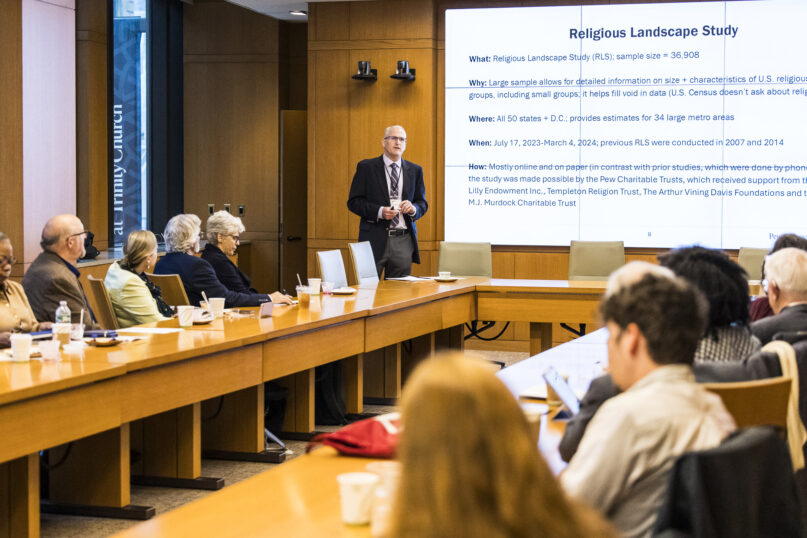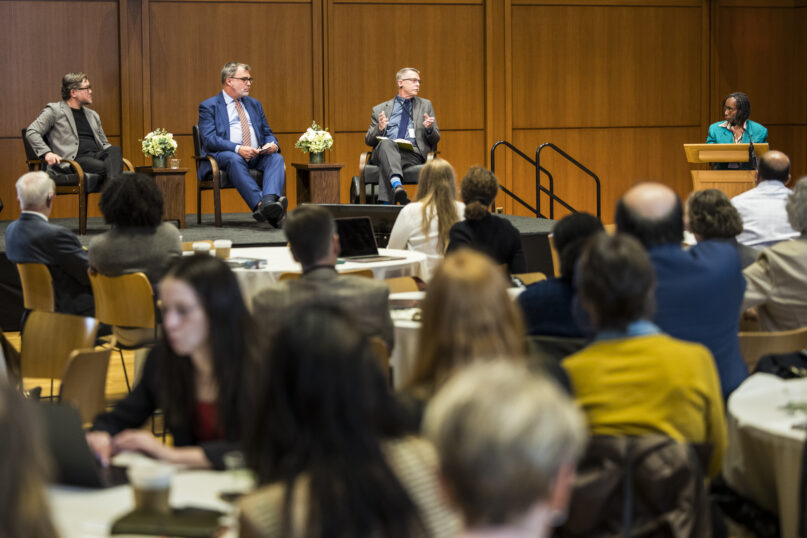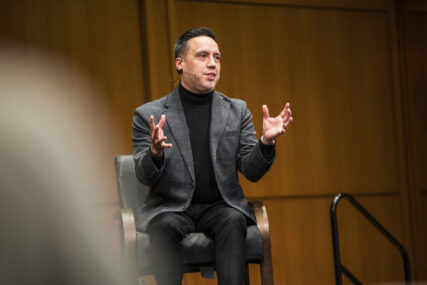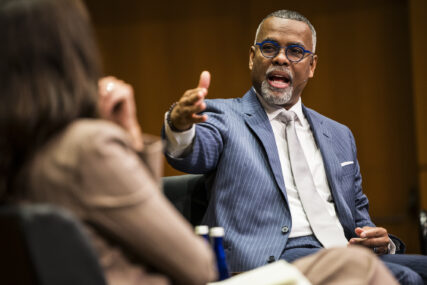(RNS) — At a moment when technology impacts not only economies and elections but belief itself, Religion News Service convened an all-day symposium to ask: What does faith mean in a digital age – and who holds the power to shape it?
Emceed by Niala Boodhoo and Wajahat Ali, the event drew scholars, clergy, journalists and activists from across the country, exploring the intersection of religion, politics and technology in 2025. Participants wrestled with themes that have long animated spiritual life. They explored what it means to be human. And they reckoned with technological changes that have transformed the way we interact with one another.
“Who holds the power to shape faith?”
Opening the day, RNS CEO & Publisher Deborah Caldwell reminded the audience of RNS’ founding ideal: that understanding one another’s faiths strengthens democracy itself. Today, she said, that ideal faces new tests. “When algorithms determine what people see, hear and trust,” Caldwell asked, “who holds the power to shape faith and civic life?”
The data behind America’s shifting faith
Gregory Smith of Pew Research Center set the stage with new findings from the organization’s Religious Landscape Study. After decades of decline, he said, religious affiliation in the United States has stabilized – but along sharper partisan lines, with religiously affiliated voters concentrating, though still declining, in the Republican Party.
Yet while American Christians are self-sorting by political party, most reject the notion of divine political endorsements: Only 2% to 4% say God directly chose the winners of the last two U.S. presidential elections because God preferred their policies, and 80% say good Christians can have different views about the current president. “The U.S. remains a place where most Christians believe people of good faith can disagree about politics,” Smith said.

Gregory Smith presents during the 2025 RNS symposium at Trinity Church NYC, Wednesday, Oct. 22, 2025, in New York City. (RNS photo/Kisha Bari)
Faith, technology and democracy
The conversation then turned from data to values. In a powerful exchange with NPR’s Rachel Martin, Princeton scholar Eddie Glaude Jr. challenged listeners to confront how technology mediates virtue.
“The algorithms that excite us, enrage us and divide us activate [our moral commitments] in distorted ways,” said Glaude. He urged attendees to live their values with courage and to reject the idea that empathy is a sin.
Glaude also emphasized actions over arguments. “I have no interest in spending my precious breath convincing someone that I’m a human being,” he said. “I’d rather spend my energy building the world where [hatred] has no corner to breathe.”
The politics of belonging
If technology is reorganizing belief, immigration is reorganizing political loyalty, according to Pastor Tony Suárez. Suárez, a leader of the National Hispanic Christian Leadership Conference, said Latino evangelicals have risen as a political force because they have become disillusioned with both major political parties on immigration issues.
Suárez also cited the coarsening political discourse as a barrier to progress, lamenting both cancel culture he experienced from the left and quasi-messianic views of President Donald Trump that he sees from “ultra-cons” on the right.
“I long for the day when the left and right can come back to the same table of reason and have a dialogue,” he said.
A new theology of technology
Later sessions examined how technology has assumed quasi-religious dimensions. Greg Epstein, Humanist chaplain at Harvard University and the Massachusetts Institute of Technology, argued that platforms like Facebook and artificial intelligence systems now rival congregations as “the most powerful social technologies ever created,” and he likened the push for AI adoption to “a holy war.”
He also called on faith leaders to help counter what he described as a “humanity deficit.” “We’ve invested the best and biggest of our capacities as human beings not into ourselves, not into one another, not into caring, not into compassion, not into nurturing; we’ve invested it in technology,” he said. “The people in this room are uniquely qualified to understand that and to do something about the fact that we’ve gone astray.”
A panel on morality in AI followed, exploring whether religious ethics could offer guardrails for technology. Catholic University Executive Vice President and former co-editor of AI and Faith Haley Griese discussed how faith traditions can guide technology — by centering the human user, promoting human flourishing and encouraging authentic human interactions. “The human has to be the central character,” Dominguez said.
Faith and the social safety net
In an afternoon panel, faith leaders confronted the unraveling of federal partnerships that long sustained faith-based social services. The Rev. Eugene Cho, president of Bread for the World, described recent funding cuts by the Trump administration as “chaotic and cruel,” with millions of lives at stake.
Mark Hetfield, president of the Jewish-led refugee agency HIAS, said the administration’s abrupt shutdown of contracts had erased trust built over decades — and that its antipathy toward organizations working with noncitizens was having a chilling effect. “The Jewish community in particular is wrestling with this,” he said. “It’s part of our faith to welcome the stranger.”
Stanley Carlson-Thies, founder of the Institutional Religious Freedom Alliance, agreed. “There’s been this explosive disruption to the whole partnership system,” he said. “It means anyone who wants to connect with the government is under huge strain and uncertainty.”

The Rev. Eugene Cho, from left, Mark Hetfield and Stanley Carlson-Thies at Trinity Church NYC, Wednesday, Oct. 22, 2025, in New York City. (RNS photo/Kisha Bari)
Hope after hate
The day ended on a note of extraordinary grace. The Rev. Eric Manning of Mother Emanuel AME Church and Rabbi Hazzan Jeffrey Myers of Pittsburgh’s Tree of Life Congregation – leaders of two communities shattered by hate-fueled violence – spoke about how their bond reminds others of our shared humanity.
“When people see the Rabbi and I together, they see a sense of hope,” said Manning. “Tragedy brought us together, but love keeps us together. When we understand that, in those key moments, hopefully people will have enough sense to be quiet and ask themselves: If they can do it, why can’t we?”
Myers talked about the responsibility faith leaders have to offer an example to their parishioners. “When faith leaders model what we want to become the norm,” he said, “we give others permission to do the same.”
A call to moral imagination
By evening, the question that began the day — who holds the power to shape faith — had taken on new weight. The answers, speakers suggested, will depend less on technology itself than on the moral courage of those who use it.





